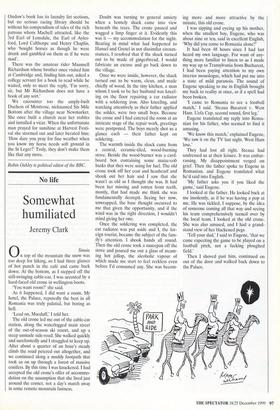No life
Somewhat humiliated
Jeremy Clark OSinaia n top of the mountain the snow was too deep for hiking, so I had three glasses of hot punch in the café and came back down. At the bottom, as I stepped off the still-swinging cable-car, I was accosted by a hard-faced old crone in wellington boots.
'You want room?' she said.
As it happened, I did want a room. My hotel, the Palace, reputedly the best in all Romania was truly palatial, but boring as hell.
'Lead on, Macduff,' I told her.
The old crone led me out of the cable-car station, along the waterlogged main street of the out-of-season ski resort, and up a steep unmade side-road. She walked quickly and surefootedly and I struggled to keep up. After about a quarter of an hour's steady climb the road petered out altogether, and we continued along a muddy footpath that took us on up through a forest of massive conifers. By this time I was lcnackered. I had accepted the old crone's offer of accommo- dation on the assumption that she lived just around the corner, not a day's march away in some remote mountain fastness. Doubt was turning to general anxiety when a homely shack came into view beneath the trees. The crone paused and wagged a limp finger at it. Evidently this was it — my accommodation for the night. Bearing in mind what had happened to Hansel and Gretel in not dissimilar circum- stances, I resolved that if the shack turned out to be made of gingerbread, I would fabricate an excuse and go back down to the village.
Once we were inside, however, the shack turned out to be warm, clean, and made chiefly of wood. In the tiny kitchen, a man whom I took to be her husband was kneel- ing on the floor repairing a car radiator with a soldering iron. Also kneeling, and watching attentively as their father applied the solder, were two small boys. Because the crone and I had entered the room at an intricate stage of the repair work, greetings were postponed. The boys merely shot us a glance each — their father kept on soldering.
The warmth inside the shack came from a central, ceramic-tiled, wood-burning stove. Beside the wood-burner was a card- board box containing some maize-cob husks that they were using for fuel. The old crone took off her coat and headscarf and shook out her hair and I saw that she wasn't as old as I thought she was. It had been her missing and rotten front teeth, mostly, that had made me think she was fundamentally decrepit. Seeing her now, unwrapped, the base thought occurred to me that given the opportunity, and if the wind was in the right direction, I wouldn't mind giving her one.
Once the soldering was completed, the car radiator was put aside and I, the for- eign tourist, became the subject of the fam- ily's attention. I shook hands all round. Then the old crone took a saucepan off the stove and poured me out a glass of steam- ing hot jollop, the alcoholic vapour of which made me start to feel reckless even before I'd consumed any. She was becom-
ing more and more attractive by the minute, this old crone.
I was sipping and eyeing up his mother, when the smallest boy, Eugene, who was about nine or ten, said in excellent English, 'Why did you come to Romania alone?'
It had been 48 hours since I had last heard my own language. For want of any- thing more familiar to listen to as I made my way up to Transylvania from Bucharest, I had been paying attention to my own interior monologue, which had put me into a state of mild paranoia. The sound of Eugene speaking to me in English brought me back to reality at once, as if a spell had been broken.
'I came to Romania to see a football match,' I said. `Steaua Bucarest v. West Ham. Uefa Cup, second round, first leg.'
Eugene translated my reply into Roma- nian for his father, who seemed to find it amusing.
'We know this match,' explained Eugene, 'We saw it on the TV last night. West Ham lose.'
They had lost all • right. Steaua had undressed us at their leisure. It was embar- rassing. My disappointment verged on grief. Then the father spoke to Eugene in Romanian, and Eugene translated what he'd said into English.
'My father asks you if you liked the game,' said Eugene.
I looked at the father. He looked back at me insolently, as if he was having a pop at me. He was tickled, I suppose, by the idea of someone coming all that way and seeing his team comprehensively turned over by the local team. I looked at the old crone. She was also amused, and I had a grand- stand view of her blackened pegs.
'Tell your dad,' I said to Eugene, 'that we came expecting the game to be played on a football pitch, not a fucking ploughed field.'
Then I shoved past him, continued on out of the door and walked back down to the Palace.






















































































































 Previous page
Previous page